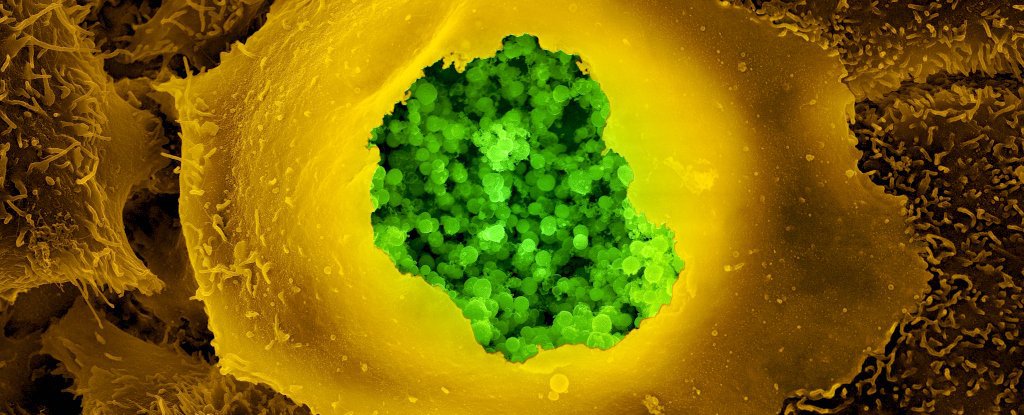“We can’t keep ignoring the evidence.”
An international group of 31 Alzheimer’s researchers has published an editorial urging the science world to change its focus when it comes to Alzheimer’s disease. The message is clear – after a decade of failed attempts to treat and prevent the disease, it’s time to reassess the evidence that Alzheimer’s could be spread by microbes.
The editorial specifically implicates the herpes virus – the kind that causes cold sores – and two types of bacteria, all of which have already been linked to Alzheimer’s disease.
This isn’t the first time scientists have suspected that viruses or bacteria could play a role in causing Alzheimer’s – previous studies have shown that people with Alzheimer’s tend to be more likely to be infected with certain microbes,including types of fungus, than the rest of the population.
But attempts to nail down those links have failed, so right now, the leading hypothesis is that Alzheimer’s is caused by the build-up of sticky amyloid plaques and mis-folded tau proteins in the brain, which break down communication between neurons and lead to memory loss, cognitive decline, and eventually death.
Now the editorial claims it’s time to consider the idea that certain viruses or bacteria are triggering this plaque build-up in the first place, and investigate whether antimicrobial drugs could help stop it. They say that the first microbes we should investigate are the herpes simplex virus type 1 (HSV1), the chlamydia bacteria, and a type of spiral-shaped bacteria called spirochaetes.
“We are saying there is incontrovertible evidence that Alzheimer’s Disease has a dormant microbial component,” said Douglas Kell, a chemist from the University of Manchester in the UK, who was one of the editorial’s authors. “We can’t keep ignoring all of the evidence.”
According to the editorial, there have been around 100 papers published on the link between HSV1 and Alzheimer’s alone.
If it’s confirmed that microbes do play a role in causing Alzheimer’s, it could help explain the growing body of evidence that suggests the disease can be spread via surgery and blood transfusion.
It would also fit in with the recent understanding that other diseases, such asstomach ulcers and types of cancer, can be triggered by microbial infection.
So how could viruses and bacteria trigger Alzheimer’s disease? Well, we still don’t really know, which is one of the reasons research has stalled in this area, but the herpes virus is already known to damage the nervous system, and microbial infections are known to inflammation around the body, which is a characteristic of Alzheimer’s disease.
Still, many researchers and funding bodies consider the link between viruses and bacteria and Alzheimer’s to be controversial or unfounded, and have chosen to look into other causes of the disease instead.
“This is a minority view,” neuroscientist John Hardy from University College London told The Telegraph. “We need always to keep an open mind but this editorial does not reflect what most researchers think about Alzheimer disease.”
That’s fair enough, but so far, investigation into more accepted hypotheses has led to 400 unsuccessful clinical trials over the past 10 year, and no solutions, and the authors of the editorial believe enough is enough.
“We write to express our concern that one particular aspect of the disease has been neglected, even though treatment based on it might slow or arrest Alzheimer’s disease progression,” they write in the Journal of Alzheimer’s Disease. “We propose that further research on the role of infectious agents in Alzheimer’s disease causation, including prospective trials of antimicrobial therapy, is now justified.”
Of course, the issue is not as clear-cut as the editorial makes it out to be – if it was, we’d already know how to fix the disease. And most importantly, experts are urging people not to freak out about the implication that Alzheimer’s could be ‘caught’.
“While these observations are interesting and warrant further research, there is currently insufficient evidence to tell us that microbes are responsible for causing Alzheimer’s disease in the vast majority of cases,” said James Pickett, head of research at the UK Alzheimer’s Society. “We would like to reassure people that there remains no convincing evidence that Alzheimer’s disease is contagious or can be passed from person to person like a virus.”
But for such a rapidly growing global issue, it’s definitely a hypothesis worth following up, because it’s only by narrowing down what doesn’t cause Alzheimer’s that we’ll get closer to understanding how it occurs.
“We welcome research that explores all possible avenues and have committed £100 million over the next decade to more fully understand the causes of dementia and to improve diagnosis, treatment and prevention of the condition,”said Pickett.
Source: Scientists identify a virus and two bacteria that could be causing Alzheimer’s – ScienceAlert












Leave A Reply